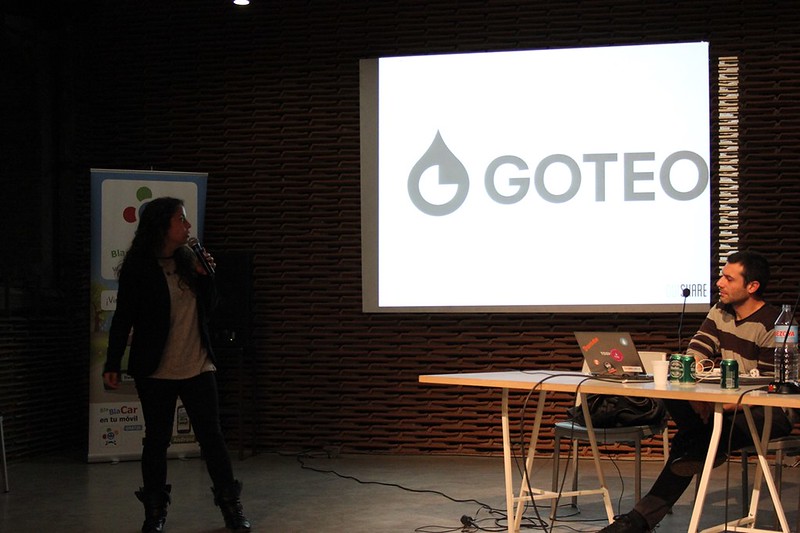
NEWS


NEWS
Published
Dr Isabel Villegas Simón (Postdoctoral Researcher at the Universitat Pompeu Fabra) recently had the opportunity to speak to Olivier Schulbaum and Eva Frade from the Platoniq Foundation who founded Goteo, one of ReDigIm’s cooperation partners. In this blog post, Isabel discusses what she found out about the goals and principles of Platoniq and how these underpin Goteo.

Goteo serves as the cooperation partner for the Spanish Team in the ReDigIm Project. As described on its website, “Goteo is a platform for civic crowdfunding and collaboration on citizen initiatives and social, cultural, technological and educational projects.” These projects not only offer individual rewards but also generate a collective return by promoting commons, open-source initiatives and free knowledge. Goteo operates under the Platoniq Foundation, which is dedicated to agile design thinking, fostering a more democratic engagement with cultural heritage. Platoniq is focused on co-designing digital tools and methodologies for citizen participation in education, the economy and social innovation. Goteo stands out as an exemplary case in the digitization of prosocial practices, showcasing a strong commitment to social projects and open-source initiatives. To delve deeper into Goteo, Platoniq, and their operational philosophy, we had the opportunity to speak with Olivier Schulbaum (the founder and strategic director of Platoniq) and Eva Frade (the administrative management coordinator, jurist and secretary of Platoniq).
In broad terms, Platoniq endeavours to enhance and facilitate social and citizen discourse, as articulated by Olivier Schulbaum: “We work to energize groups, to help people understand each other better and make better decisions, in short, to improve governance and their interactions.” This social commitment translates into three main pillars that form the backbone of Platoniq’s actions. Firstly, there is a commitment to safeguarding citizens’ rights to engage in public decision-making processes, ensuring transparency and enforceability. In this regard, Olivier emphasised the Platoniq’s pivotal role in assisting institutions, such as public administrations, in crafting participation frameworks that are grounded in transparency and which respect the “quality time” needed for individuals to comprehend and contemplate complexities during decision-making. The second pillar revolves around what Olivier deemed Platoniq’s fundamental strategy: “Culture is the means to create more social cohesion.” This dimension, labelled “future culture”, aspires to establish a neutral and secure platform where even the most divergent and polarized perspectives in society can initiate dialogue. The third pillar shows Platoniq’s commitment to the social and solidarity economy. Specifically, Platoniq focuses on streamlining social and solidarity economy projects on various fronts. This includes providing strategic support at economic and organizational levels and seeking enhanced incentives for users to actively participate in such projects.
Focusing on Goteo, Platoniq’s founder prefers to characterize Goteo as “a tool for participation” rather than simply a crowdfunding platform. Goteo emerged in the aftermath of the 2008 crisis, a period marked by a decline in support for social economy projects due to the economic recession and austerity policies. Currently, Goteo embraces and champions projects that seek and ensure a social return through crowdfunding. According to Eva Frade, “We work with a framework based on social and community rights where the core of the claim is to fight for something better so that the reward for participating is basically a ‘thank you’ for supporting that fight or that idea.” This emphasizes how Goteo serves as a launchpad for social projects often deemed ‘under the radar’ – projects that originate informally but, through Goteo’s platform, increase their visibility, gain more contributors and develop a more robust and recognised organizational structure. For example, Eva cited success stories like Top Manta, a project initiated by street vendors in Barcelona. Starting as an association, Top Manta has evolved into a cooperative with substantial visibility and institutional support. While acknowledging that the project volume might be lower compared to other crowdfunding platforms due to these criteria, Goteo achieves remarkably high success rates in realising its projects.
Lastly, it is noteworthy to highlight Goteo’s steadfast commitment to open-source principles from its inception. Undoubtedly, this aspect adds to the project’s appeal and makes it an intriguing prospect for collaboration with research centres and universities. According to Eva, the data generated by Goteo fosters a symbiotic relationship with research institutions and universities: “We can provide them with the data for research, and they, in turn, can offer the narrative explaining why.” In this capacity, Goteo contributes the practical dimension—data and experiences—to complement more theoretical research undertaken in academic settings.
Indeed, both Goteo and Platoniq have prior experience collaborating in European-funded projects with research centres and universities. Notably, applying the Sustainable Development Goals (SDGs) to categorize and structure projects enabled through Goteo has emerged as a significant outcome of these collaborations. These projects are now grouped into three distinct footprints, delineating Goteo’s objectives: the social footprint, the democratic footprint and the ecological footprint.
Contemplating the future, Olivier stressed his belief that political shifts will drive increased citizen engagement, evident in the participation of projects akin to those hosted on and funded via Goteo. “Goteo is the social thermometer measuring citizen mobilization”, he remarked.